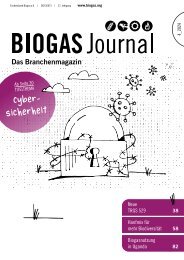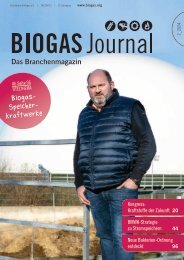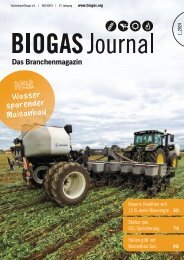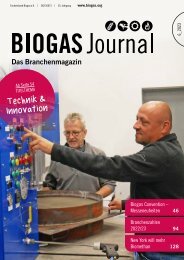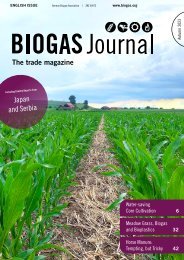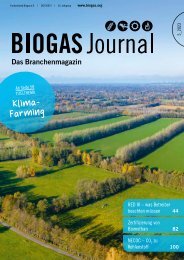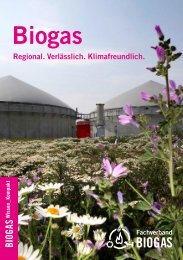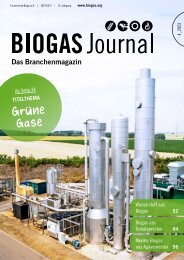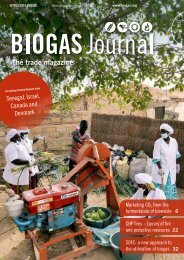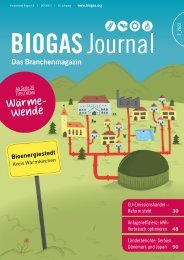Create successful ePaper yourself
Turn your PDF publications into a flip-book with our unique Google optimized e-Paper software.
English Issue<br />
Biogas Journal<br />
| <strong>Autumn</strong>_<strong>2017</strong><br />
Figure 1:<br />
Biogas plant in Pomerode,<br />
Santa Catarina.<br />
Brasilia<br />
Biogas in Brazil – New<br />
perspectives in times of crisis<br />
photo: Jens Giersdorf<br />
For a few years now, Brazil has been going through an economic and political<br />
crisis, which also makes investments in biogas plants difficult. Nevertheless,<br />
technology providers are in demand and some German and European companies<br />
have already developed successful solutions with Brazilian partners in order to<br />
utilize the theoretically great potential.<br />
By Jens Giersdorf and Wolfgang Roller<br />
In December 2016, the government of Brazil<br />
launched a biofuel programme that expressly includes<br />
biomethane as well. An improvement in the<br />
conditions for support and financing could help<br />
the biogas market in Brazil finally achieve a breakthrough.<br />
The aim of the “RenovaBio” programme is to<br />
increase the percentage of renewable fuels compatibly<br />
with market growth and Brazil’s international climate<br />
protection commitment.<br />
Remarkably, biogas is listed for the first time together<br />
with ethanol and biodiesel, which have traditionally had<br />
a strong political lobby. Ricardo Gomide of the Brazilian<br />
Ministry of Mines and Energy confirms that biogas is on<br />
the agenda of the Brazilian government. According to the<br />
Brazilian Biogas Association (Abiogás), Brazil could produce<br />
71 million cubic metres (m³) per day, which would<br />
be equivalent to 44 percent of the nation’s diesel consumption<br />
or 73 percent of its natural gas consumption.<br />
For the most part, this potential is in São Paulo and<br />
the neighbouring federal states where by-products of<br />
the sugar and ethanol industries, such as filter cakes,<br />
vinasse and sugar cane stover, can be used to produce<br />
biogas. A plant in the north-western section of the state<br />
of Paraná has been producing biogas since as early as<br />
2011 based on this feedstock. Currently, this biogas is<br />
being converted into electricity in several CHPs with a<br />
total 10 MW el<br />
installed capacity. The electricity auction<br />
in April 2016 proved that the conversion of biogas<br />
based on by-products of sugar and ethanol production<br />
in Brazil is not only technologically possible, but is also<br />
competitive.<br />
Project PROBIOGAS<br />
From the beginning of 2013 through the beginning of <strong>2017</strong>,<br />
commissioned by the German Federal Ministry for Economic Cooperation<br />
and Development (BMZ) and together with the Brazilian<br />
Ministry ofCities, the GIZ implemented the German-Brazilian<br />
project for promoting the use of biogas – PROBIOGAS (DKTI). In<br />
the context of the project and its around 39 measures, more than<br />
2,000 people received advanced training, 1,300 participated in<br />
the project, and 17 publications were created. All of the publications<br />
can be downloaded from the project website: http://www.<br />
cidades.gov.br/saneamento-cidades/probiogas<br />
38




